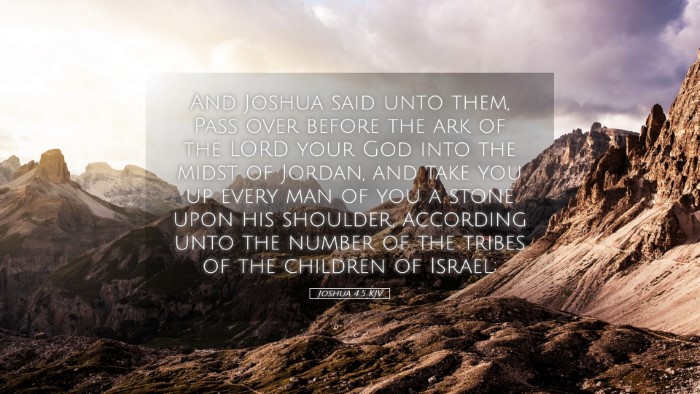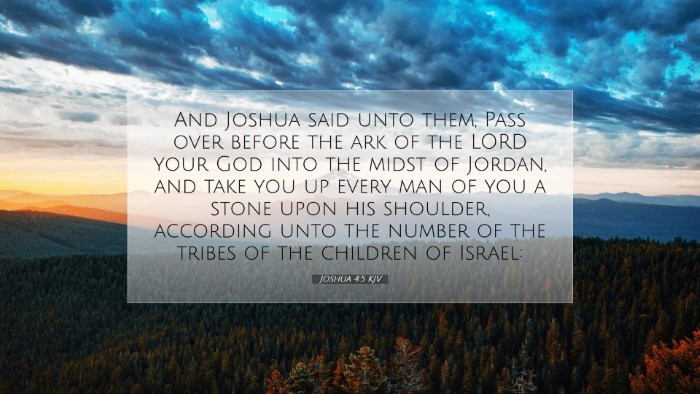Old Testament
Genesis Exodus Leviticus Numbers Deuteronomy Joshua Judges Ruth 1 Samuel 2 Samuel 1 Kings 2 Kings 1 Chronicles 2 Chronicles Ezra Nehemiah Esther Job Psalms Proverbs Ecclesiastes Song of Solomon Isaiah Jeremiah Lamentations Ezekiel Daniel Hosea Joel Amos Obadiah Jonah Micah Nahum Habakkuk Zephaniah Haggai Zechariah MalachiJoshua 4:5
Joshua 4:5 KJV
And Joshua said unto them, Pass over before the ark of the LORD your God into the midst of Jordan, and take you up every man of you a stone upon his shoulder, according unto the number of the tribes of the children of Israel:
Joshua 4:5 Bible Commentary
Commentary on Joshua 4:5
Verse: "And Joshua said unto them, Pass over before the ark of the LORD your God into the midst of Jordan; and take you up every man of you a stone upon his shoulder, according unto the number of the tribes of the children of Israel."
Introduction
This significant moment in the book of Joshua marks the Israelites' transition into the Promised Land. This commentary synthesizes insights from public domain sources including Matthew Henry, Albert Barnes, and Adam Clarke to offer a profound understanding of this pivotal verse.
Contextual Background
The event takes place just after the Israelites have miraculously crossed the Jordan River, which had been divided to provide passage. This act signifies not only God's power but also His faithfulness to His covenant with the Israelites.
- Historical Significance: The crossing of the Jordan River is a moment that reaffirms God's promise to His people, resonating with the earlier crossing of the Red Sea.
- The Ark of the Covenant: Central to this narrative, the Ark symbolizes God's presence and guidance, pivotal in Israel's journey.
Interpretative Insights
This verse is rich in symbolism and offers several layers of meaning and interpretation.
1. Leadership and Obedience
Joshua's command demonstrates his role as a divinely appointed leader, guiding the people through both spiritual and physical challenges. Matthew Henry emphasizes that faithful and obedient leadership is essential in navigating God's commands.
2. Symbolism of the Stones
The stones that are to be taken from the riverbed serve as memorials. Barnes notes that these stones represent a testimony of God's deliverance and faithfulness through generations. They call the future generations to remember what God has done.
3. Community Involvement
Each tribe is called to contribute, indicating the importance of communal effort in God's work. Adam Clarke remarks on how the unity of the tribes reflects the diverse contributions of each believer in the community of faith.
Theological Implications
This verse embodies significant theological themes that are critical for pastors, students, and scholars alike.
- Remembrance: The act of setting up stones as a memorial points to an important practice in the life of faith; to remember what God has done is to instill faith and hope in future generations.
- God's Faithfulness: This event marks God's continuing presence among His people, reminiscent of the New Testament principle of God’s unwavering faithfulness.
- Christian Unity: The collaborative effort of the tribes underlines the unity of the church, which is essential for the body of Christ to function effectively.
Practical Applications
As we reflect on Joshua 4:5, several applications emerge that can guide our personal and communal faith.
1. Practice of Memorials
In modern faith communities, establishing memorials or practices to remember God’s provisions can help encourage faith. This can take the form of testimonies, memorial services, or even rituals that focus on God’s actions.
2. Leadership Responsibility
For leaders, this verse urges the importance of guiding others with wisdom and obedience to God’s commands, ensuring that the focus remains on His presence—as symbolized by the Ark.
3. Fostering Community
Engaging every member of the community in service and witness cultivates a sense of belonging and shared mission, which is foundational to the church as the Body of Christ.
Conclusion
Joshua 4:5 serves as an excellent exhortation to remember God’s faithfulness and to engage actively as a community of believers. The call to take up stones is a powerful metaphor for the responsibility of every believer to carry forth the legacy of faith. As Martin Luther once stated, the church must be a community that remembers and proclaims the mighty works of God, just as Israel did at the entrance to the Promised Land.


